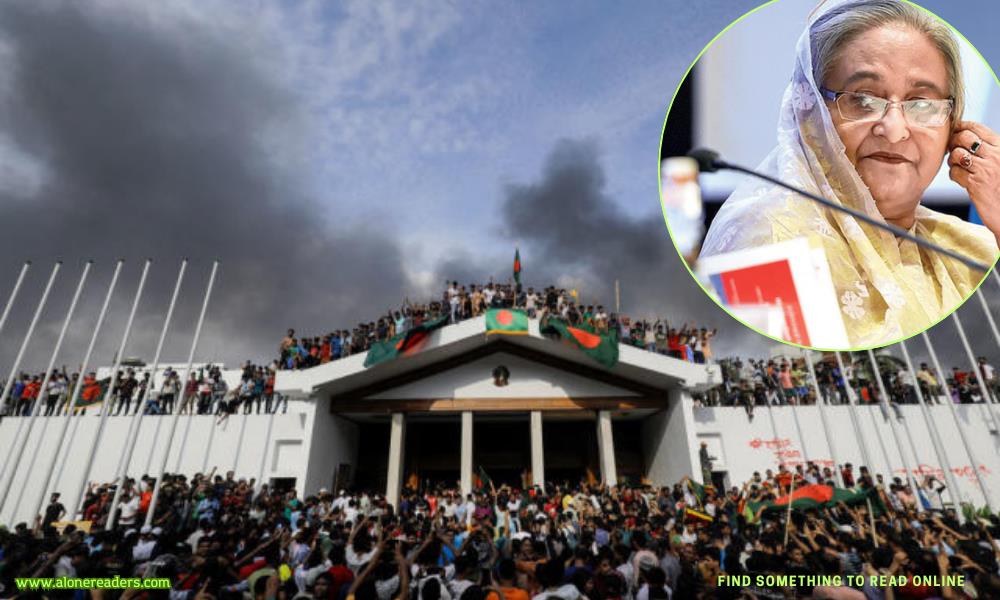
In a dramatic turn of events, Bangladesh has witnessed a seismic shift in its political landscape. After weeks of intensifying mass protests, Prime Minister Sheikh Hasina has been forced out of office, marking the end of her decade-long rule. The protests, which erupted across the nation, culminated in the return of Nobel Peace Prize laureate Muhammad Yunus, who has now been appointed to lead a caretaker government until fresh elections can be held.
The protests were ignited by growing dissatisfaction with the Hasina government’s policies, particularly regarding issues of corruption, suppression of dissent, and economic instability. The trigger, however, was the government's decision to introduce new electoral laws that critics argue would severely undermine the democratic process by favoring the ruling party, the Awami League.
The opposition, civil society groups, and large swathes of the general population perceived this move as an attempt by Sheikh Hasina to consolidate power and pave the way for an undemocratic re-election. The growing discontent quickly snowballed into mass protests, with thousands taking to the streets across Dhaka and other major cities in Bangladesh.
As the protests gained momentum, the government’s initial response was to impose strict crackdowns, including the use of force against demonstrators and the arrest of opposition leaders. However, these measures only fueled the anger of the population, leading to even larger gatherings and strikes. The international community also expressed concern, with many calling for the respect of democratic principles and human rights in Bangladesh.
The tipping point came when several high-profile members of the ruling party defected, voicing their concerns about the direction in which the country was heading. This, coupled with a general strike that paralyzed the nation for several days, made it increasingly clear that Sheikh Hasina’s position was untenable.
Facing mounting pressure both domestically and internationally, Sheikh Hasina announced her resignation in a televised address. In her speech, she defended her government’s record but acknowledged that the ongoing unrest made it impossible for her to continue in her role. Hasina's departure marks the end of an era in Bangladeshi politics, where she has been a dominant figure for much of the past three decades.
The resignation was met with celebrations across the country, with many viewing it as a victory for democracy and the rule of law. However, the situation remained tense, with uncertainty looming over the future leadership of the nation.
In a move that surprised many, Nobel Peace Prize laureate Muhammad Yunus, known internationally for his work in microfinance and poverty alleviation, returned to Bangladesh to take up the mantle of leading a caretaker government. Yunus, who had been living abroad due to political pressures under the Hasina administration, was seen as a unifying figure capable of steering the country through this turbulent period.
Upon his return, Yunus addressed the nation, calling for calm and unity. He emphasized the importance of restoring trust in the democratic process and vowed to oversee free and fair elections. His appointment has been welcomed by both domestic and international observers, who see Yunus as a credible leader with a track record of integrity and service to the people.
While the removal of Sheikh Hasina has quelled immediate unrest, the task ahead for Muhammad Yunus and the caretaker government is daunting. The country remains deeply divided, and the economic challenges that fueled much of the discontent are still unresolved.
One of the key priorities for Yunus will be to restore confidence in the electoral system. This will involve reversing the controversial electoral laws introduced by the Hasina government and ensuring that the upcoming elections are transparent and inclusive. Additionally, Yunus will need to address the issue of corruption, which has plagued the country for years, and work towards stabilizing the economy.
Another significant challenge will be managing the expectations of the protestors. While the removal of Sheikh Hasina has been a major victory, many of the underlying issues that drove people to the streets remain. The caretaker government will need to engage with a wide range of stakeholders, including opposition parties, civil society groups, and the general public, to build a consensus on the way forward.
The international community has reacted cautiously to the developments in Bangladesh. While there has been widespread support for the peaceful transition of power, there are concerns about the stability of the country and the potential for further unrest. Bangladesh is a key player in South Asia, and its political stability is crucial for the region.
Neighboring countries, particularly India, have a vested interest in ensuring that the situation in Bangladesh does not spiral out of control. India, which shares a long border with Bangladesh, has historically had close ties with Sheikh Hasina and her government. The change in leadership is likely to have implications for bilateral relations, and it remains to be seen how the new caretaker government will navigate this complex relationship.
The United States and the European Union have both expressed support for the caretaker government and have called for free and fair elections. There is also an expectation that the international community will provide support to Bangladesh in managing the economic challenges that lie ahead.
Looking Ahead
The ousting of Prime Minister Sheikh Hasina and the return of Muhammad Yunus to lead a caretaker government marks a significant moment in Bangladesh’s history. The country now stands at a crossroads, with the potential to either emerge stronger through a renewed commitment to democracy or face continued instability if the underlying issues are not addressed.
For the people of Bangladesh, the hope is that this transition will lead to a more just and equitable society, where the rule of law is upheld, and the voices of all citizens are heard. The coming months will be crucial in determining the future direction of the nation, and much will depend on the ability of Muhammad Yunus and the caretaker government to deliver on their promises and restore faith in the country’s democratic institutions.